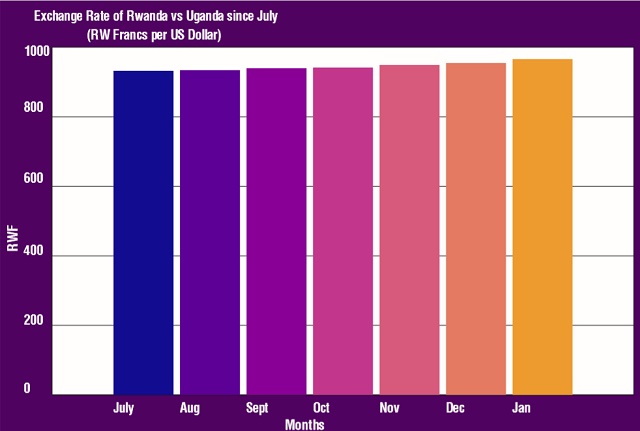
Dispute costing businesses
The year-long border shut down has had business implications on the hundreds of traders who ply the route from Kampala to Kigali.
A number of Ugandan companies that produce mainly cement, steel, roofing material, cooking oil, salt, beverages, spirits, vinegar, soaps and fuels no longer export to Rwanda. They have instead looked for alternative markets in DRC and South Sudan.
Roofings, Hima Cement and Movit are among the companies that have stopped exports to Rwanda, following the closure of the border.
Subsequently, Uganda’s export earnings have dropped from as high as an average of US$15.6million monthly in January to an average of US$0.68million as at the end of December last year, according to data from Bank of Uganda.
On an annual basis, Uganda’s export earnings to Rwanda dropped from US$212million in 2018 to US$41.5million last year.
On the other hand, Uganda’s imports from Rwanda have fallen from an average of US$1.5million to an average of US$0.68million per month. Uganda has been importing edible vegetables and raw hides and skins.
Looking at the entire year, Rwanda’s exports to Uganda declined from US$18.13million in 2018 to US$15.7million.
This development, however, could partly explain the reasons behind the surge in some prices of some food stuffs in Rwanda, which were initially imported from Uganda.
According to the National Bank of Rwanda, in January 2020, the Rwandan urban consumer price index increased by 0.6% month-to-month higher than a decrease of 0.3% achieved in the previous month.
Although the statement does not pin the CPI index on the border incident, it is hard to overlook. As a snapshot of the 12-month blockade of goods and services, Year-on-year inflation stood at 7.3% for January 2020 compared to 6.7% reached in December 2019.
“On monthly basis, the inflationary pressures were due to food and non-alcoholic beverages whose prices increased by 0.6% in January from a decrease of 0.3% recorded in the previous month,” the statement read.
“Prices increased particularly for food products including Irish potato, fermented sorghum, sweet potato, sorghum, palm oil, taro, local rice, live chicken among others. Overall, there was an increase in prices of fresh products (0.3% in January compared to a decrease of 2.8% realized in the previous month).”
Year-on-year, consumer price index rose by 7.3% higher than 6.7% in December 2019 partly due to inflationary pressures from food and non-alcoholic beverages (15.8% compared to 14.9% in December, the statement added.
The central bank of Rwanda noted that there would be a “continuing rise in prices of alcoholic beverages and tobacco (21.1% against 20.6% in December) and the uptick in prices of housing, water, electricity, gas and other fuels (2.4% after 2.2% in December2019).”
A Rwandan citizen who preferred anonymity told The Independent in November 2019, “Price hikes every now and then. You can imagine the price of 1kilogramme of beans has doubled its period in a price of three months.”
Data from a site that aggregates exchange rate movements in the world shows that the Rwanda Franc has weakened against the US Dollar. From July 2019, the Rwanda Franc steadily loses ground against the US Dollar in the period up to January and the trend had not relented till February.

****
 The Independent Uganda: You get the Truth we Pay the Price
The Independent Uganda: You get the Truth we Pay the Price



These oldies are just wasting our tax money, business opportunities and other fortunes.
They are treacherous criminals who came to power through the very criminal means, which they are now accusing each other of engaging in and counteracting in.
Look at Sam Kuteesa above, face and stomach bloated with corruption. What a curse to people of the two countries.